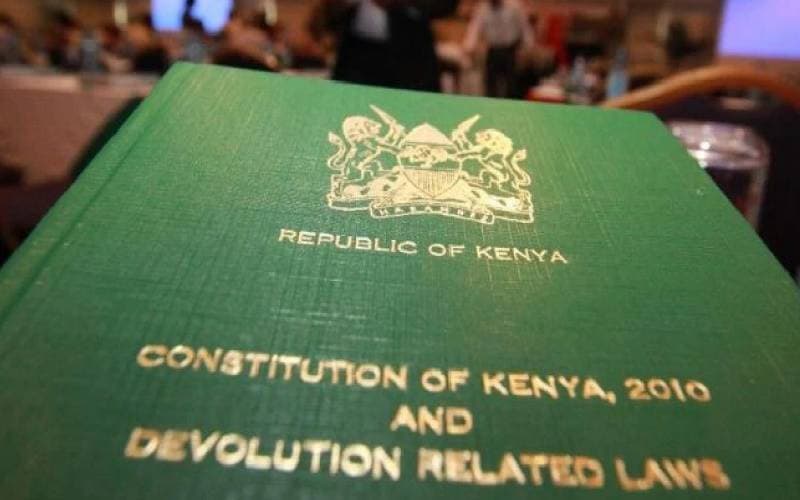We're loading the full news article for you. This includes the article content, images, author information, and related articles.
Recent legislative repeals signal a determined effort by the Kenyan government to modernize its statute book and align national laws with the progressive 2010 Constitution, yet civil society maintains that many repressive statutes remain.

NAIROBI, KENYA – The Kenyan government has intensified its efforts to purge colonial-era and outdated legislation from its law books, a move aimed at aligning the nation's legal framework with the 2010 Constitution. This initiative gained momentum on Friday, November 21, 2025, when President William Ruto assented to the Provisional Collection of Taxes and Duties (Repeal) Act, 2025, officially removing a 1959 statute from Kenya's laws. The repealed law had controversially allowed the government to collect taxes before the relevant finance bill was fully enacted by Parliament, a practice the High Court declared unconstitutional in 2018.
The repeal bill, sponsored by National Assembly Majority Leader Kimani Ichung'wah, was part of a broader legislative agenda to modernize Kenya's statutes. The original Act, which commenced in 1959, was identified as a relic of the colonial administration that contradicted the constitutional principle of parliamentary oversight in taxation. The move to expunge it has been framed by the government as a necessary step to “clean up the statute book” and reinforce constitutional safeguards on public finance.
At the forefront of this systemic overhaul is the Kenya Law Reform Commission (KLRC), an institution established in 1982. The KLRC holds the statutory mandate to continuously review all laws in Kenya to ensure they are modern, relevant, and harmonized with the Constitution. Its mission is to spearhead the “elimination of anomalies, the repeal of obsolete and unnecessary enactments and generally its simplification and modernization.” The 2010 Constitution significantly expanded this role, requiring the KLRC to audit over 700 pieces of existing legislation to ensure their conformity with the new constitutional dispensation.
In January 2025, the Attorney General's office announced a collaboration with the KLRC to systematically identify and eliminate all laws deemed unconstitutional or obsolete. This followed reports that courts had already declared around 100 pieces of legislation unconstitutional. The process involves detailed audits and consultations to pave the way for parliamentary action.
Despite recent progress, legal analysts and civil society organizations argue that numerous repressive laws, many inherited from the British colonial administration, remain in effect and continue to undermine fundamental rights and freedoms. These laws were originally designed to suppress dissent and control the local population during the colonial period, which officially ended on December 12, 1963.
Examples frequently cited include the Public Order Act (Cap 56), which gives police broad powers to prohibit or stop public assemblies and is often used to restrict protests. Critics argue this directly contravenes Article 37 of the Constitution, which guarantees the right to freedom of assembly. Similarly, sections of the Penal Code (Cap 63), derived from the 1860 Indian Penal Code, contain vague offenses like “idle and disorderly,” which have been used to harass marginalized groups such as street vendors and the homeless. Other statutes like the Vagrancy Act and the Official Secrets Act have also been flagged for turning poverty into a crime and limiting government transparency.
Human rights organizations have consistently called for the repeal of these laws, stating they are incompatible with Kenya's democratic framework and are often used to perpetrate human rights abuses, including arbitrary arrests and restrictions on freedom of expression. The U.S. Department of State's 2023 report on human rights in Kenya noted significant issues, including arbitrary arrests and substantial interference with the freedom of peaceful assembly. Civil society groups have also highlighted the use of excessive force by police during protests, linking it to the legal frameworks that empower such actions.
The journey to fully “Kenyanize” the nation's laws is ongoing. The process involves not only repealing archaic statutes but also ensuring that new legislation aligns with the values of the 2010 Constitution, which introduced a robust Bill of Rights and devolved power. The KLRC's work is central to this, providing the technical guidance needed for Parliament to enact the necessary reforms.
While the recent repeal of the 1959 tax law is a clear victory for constitutionalism, the continued existence of other colonial-era statutes presents a significant challenge. Stakeholders, including civil society groups and legal experts, continue to advocate for a more comprehensive and expedited review process. They maintain that true legal reform requires not just the removal of obsolete laws but a fundamental shift away from the repressive legal logic that underpinned the colonial state, ensuring that Kenya's legal system fully reflects the democratic principles and human rights standards enshrined in its own Constitution.
Keep the conversation in one place—threads here stay linked to the story and in the forums.
Sign in to start a discussion
Start a conversation about this story and keep it linked here.
Other hot threads
E-sports and Gaming Community in Kenya
Active 9 months ago
The Role of Technology in Modern Agriculture (AgriTech)
Active 9 months ago
Popular Recreational Activities Across Counties
Active 9 months ago
Investing in Youth Sports Development Programs
Active 9 months ago